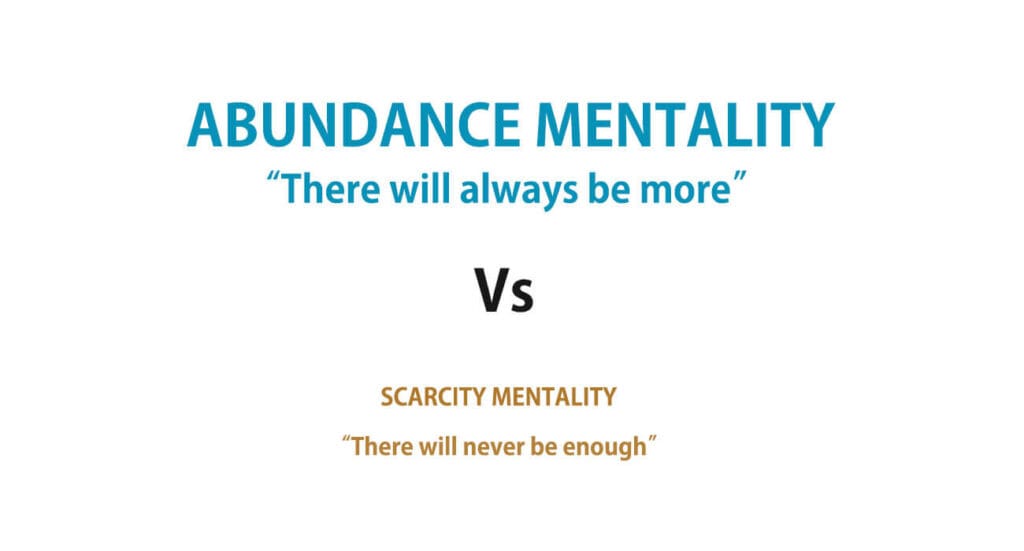About Changemaker The minimalists, Joshua & Ryan, help millions of people learn to live better…
In the argument in the abundance mentality vs scarcity mentality, we often think having an abundance mentality is better for us, but is this so?
There’s a lot of talk around the pros of an abundance mentality vs a scarcity mentality, but here we look at how both can actually be helpful (and a hindrance) to us. We have likely heard of both but if not here’s how an abundance mentality and a scarcity mentality are defined.
What Is An Abundance Mentality?
An abundance mentality is a mindset of someone who always thinks there’s more to go around, who can feel confident in sharing and knowing that there’s always enough for everyone and that more can be created especially when people co-create together.
Generally, those with an abundance mentality seem better at accepting change, as they think there’s always another chance around the corner from it and they tend to be more generous to others and share knowledge freely.
What Is A Scarcity Mentality?
A scarcity mentality assumes that there’s only a finite number of something, that once it’s fine it’s gone, and that we have to compete to get something because there will never be enough.
Someone with a scarcity mindset is generally going to think smaller and not take as many risks (at least it appears so on the surface) because they think what they have might only get smaller if they change. They compete to stay on top of what they have rather than collaborate to stay on top like those with an abundance mentality.
They may also become too fixated on one problem in life and not see the other opportunities or needs around them.


Why An Abundance Mindset Is Needed
Collectively as a society, we are generally always better off when we co-create and join together. Two people together can always get a lot more done than one person on their own, and together we can create more value, and therefore more opportunity and choice.
This leads to people feeling more comfortable taking risks they wouldn’t if they had a scarcity mentality.
For example, when you assume that there’s enough pie for everyone you don’t worry so much about something like money. You know it’s important to help you survive but it’s only one piece of the ever-expanding jigsaw, and when you take your mind away from focusing solely to n the need to make money you find you have a healthier overall mind that sees the importance in also exercising, finding time for friends and family, and learning something new.
When you do those other things your mind becomes healthier and you find money tends to gravitate towards you easier.
There’s this positive belief in you reap what you sow, and therefore when you believe there’s enough to go around you subconsciously seek out more opportunities to make more.
When you have an abundance mentality you generally feel better about yourself, more balanced in life, you have a more positive energy that is directed towards self-improvement and the improvement of others. You don’t think you are fighting so much against others or that you need to act a certain way to fit in.
It’s certainly a case of becoming more conscious than blind in your outlook.
Without an abundance mentality, we might not develop fundamental skills for human survival.
There’s a reason why humans prospered and lived longer lives when civilizations were founded. Before that tribes and armies just keep killing each other fighting for territory.
When we realised we were better off working together in abundance then the global population soared, as did productivity.
An abundance mentality has allowed our minds to continually evolve. Had we settled for what we knew and refused to grow any further then we might still be living in caves, or not be living at all.
An abundance mentality is vital towards humanity’s progress as it helps provide us with the energy to work on something bigger than ourselves, something for the greater good of humanity.
Abundance creates love for fellow humans even if they are strangers. You find you become more grateful for what you have and more open in relationships. It brings a lot of hope and opportunity to each other as it opens doors that a scarcity mentality would likely close (or just not see).
For example, if you were to say ‘yes’ (within reason) to more things you would find you suddenly had more options in your life.
Let’s say you followed this exercise.
Go to a search engine and type in ‘try something new ideas’. Then randomly pick one of the suggestions from a website that comes up. Let’s say the suggestion says ‘listen to a podcast’ and then you select a random podcast which talks about a subject you have no thought to before, but you then looked further into it, and then decided to give it a try, say photography, and you found a hidden talent.
This good then open up doors to a whole new career, a whole new circle of people, or just become an interesting new hobby that gets you out the grind of the same thinking.
Even if it turned out not to be an opportunity those with an abundance mentality wouldn’t mind as there would always be something else around the corner.
Why A Scarcity Mindset Is Also Needed
With that all said if an abundance mentality is so much more positive for us then why would anyone want to demonstrate a scarcity mentality?
We often focus on the need to break our scarcity mentality and open up a more abundant one, as a scarcity mentality can be a block towards progress (and even sanity) if we are too rigid to change, and for our general well-being, an abundance mentality is absolutely better for our personal and human development on the whole.


Yet, this doesn’t mean a scarcity mentality can’t be useful, as there are times along our development where being able to use a scarcity mentality can help us more than an abundant one.
We might forget (or not even be aware of) that through most of outer life we are developing through the survival stages of spiral dynamics, where our values and behaviors change as we evolve through the stages, but through every stage of our development we have times when we have to display a scarcity mentality in order to survive easier.
The notion that someone with a scarcity mentality won’t ever take risks isn’t strictly true. We may think they are more likely to be stuck in the same place and blindly refuse to change, but we can see evidence of how a scarcity mentality forces action.
The media sell many stories through this scarcity mentality all the time such as when we suddenly see people fighting for toilet roll when fear-mongering news around the initial stages of a pandemic was published.
The feeling of scarcity doesn’t have to drive people to desperate acts against each other though, it can also drive motivation within ourselves to do something today because tomorrow it may be too late.
In that sense, it can make us get more out of our day rather than just accepting that everything is fine and we don’t have to push as much out of our comfort zone, or we only have to make sure we are happy and healthy in life.
People healthy in life is clearly important but so to can being resourceful or seeking to get something done because a deadline is looming. Even financial markets tend to boom based on the notion of scarcity such as how Bitcoin has risen from nowhere to a multi-trillion dollar pot because of the speculative nature that a fixed supply has on people.
A scarcity mentality has long drawn people into buying something because of its limited availability, and it can actually help people value something more.
When you sell an ebook for next to nothing people don’t value it so much and don’t digest the information as well, but if you make your content limited or scarce and which can only be unlocked through paying more to unlock that value, then people will see more value in it and be likely to focus more on digesting it.
A scarcity mentality can force people to act when they feel their money is getting low, it forces survival instincts (although an abundance mindset can also drive people to want more than just the bare minimum).
Another aspect of the positive drive of a scarcity mentality would be in climate change.
The notion that our world is heating up beyond manageable means forces people, businesses, and governments to wake up and take responsibility for a growing problem.
If we just displayed an abundance mentality in climate change then we may just think there’s no problem to solve because we wouldn’t see the scarcity of our planets resources or the human impact, we would keep on creating more and more ‘abundance’ without stopping to think whether we should.
However, an abundance mentality can also give us the collective drive to realise that together we can do more to help solve the problem, so this is why we need BOTH an abundance mindset and a scarcity mindset, or more to the point, an adaptable mindset that can see abundance and scarcity as tools we pick and choose for the right situation.
Enter The Integral Mentality
Far too much we tend to think in black and white. You are either with us or against us. You should pick one or that one. You are either left or right. You like this and hate that.
But what if we adopted a more scaled approach to life?


One where we selected the right tool for the right situation, knowing situations always change and in all likelihood, we don’t ever really face exactly the same situation again, there are always variables.
The reason we become trapped in biases is that we tend to think in black and white, and even post-modern green thinkers (who share an abundance mentality and belief that we should all get along with one another) often display judgement and hypocrisy to opposing views and who end up falling into virtue-signaling identity groups and ‘isms’, which treat people as labels instead of individuals.
Then you have the scarcity mindsets who become too afraid of change because they are too afraid of rocking the boat and upsetting the status quo, a bit like tip-toeing around an overflowing bath in case they create a vibration that sends water flowing over the edge and they can never get that water back.
With a more scaled approach, people would see the merit in different opinions more, and they would see how we don’t just need to always be happy to make a decision, and we don’t need to only act when forced to by deadlines either.
An integral mindset would help people see the positives in both abundance and scarcity.
When our mind is too blindly biased to post-modern green thinking we might only think abundance is the answer to everything, and when we think in terms of capitalist ‘orange’ thinking we might purposely focus too much on developing a competitive and deadline-driven (scarce) mentality to drive customers into action before an offer is ‘gone’.
When we can see the positives in both we might find a better balance that knows when too much of one thing is too much, and which can adapt when needed.
What this essentially leads to is a more anti-fragile mindset that can grow and see abundance in times of apparent scarcity and challenge.
Of course, with an abundance mentality, we see failure as an opportunity to grow, but with a scarcity mindset, we may find that it helps us pinpoint the areas exactly where we need to grow. Listening to our doubts, but learning to channel them can be a powerful weapon to our personal and human development.









